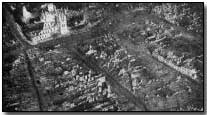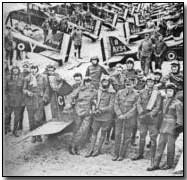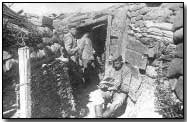Memoirs & Diaries - The First Battle of Ypres
 I bade farewell to my right
leg, and to my career as a soldier, outside a trench at Gheluvelt, near
Ypres, on October 29th, 1914. In the First Battle of Ypres the British
were out-numbered by seven to one. On the previous evening we took
over trenches - not deep or elaborate ones - from an English regiment.
I bade farewell to my right
leg, and to my career as a soldier, outside a trench at Gheluvelt, near
Ypres, on October 29th, 1914. In the First Battle of Ypres the British
were out-numbered by seven to one. On the previous evening we took
over trenches - not deep or elaborate ones - from an English regiment.
I cannot say which regiment we relieved. Our sergeant on entering the trench heard the last man, as he was doing a hurried exit, say, "So long, Jock - not 'arf a nice place, Jack Johnson all bleeding day."
On that night there was no sleep, as we had to dig and dig to improve the trench, and were being fired at all night. At 5 a.m. a group of us were standing in the open - everything had turned peaceful - admiring our now almost perfect trench when hell seemed let loose. All the guns in Flanders seemed to have suddenly concentrated on our particular sector of the British front.
When the artillery fire subsided, Germans sprang from everywhere and attacked us. My platoon held fast; we lost some good comrades. Then we were ordered to evacuate the trench, and assist to hold a trench on the flank where the fighting was fiercest. I was a sergeant, and was told to take and hold a certain part of the trench where the occupants had just been driven out.
On rushing the trench, and leaping into it, I found that the dead were lying three deep in it. After taking bearings, I told the men to keep under cover and detailed one man, Ginger Bain, as "look out".
After what seemed ages Ginger excitedly asked, "How strong is the German army?" I replied, "Seven million." "Well," said Ginger, "here is the whole bloody lot of them making for us".
We were driven from the trench, and those of us who were unscathed joined Lieutenant Brook, who had come up with cooks, transport men, and men who had been wounded but could still use a rifle.
Lieutenant Brook was (outwardly) quite unperturbed, walking about the firing line issuing orders as if on the barrack square. I had served under him for nine years, and seeing him such a target for the enemy riflemen, I asked him to lie down as I felt if he was hit his loss at that particular time would be disastrous. He told me we must retake the trench I had been driven from, and to pick twenty men to do so.
All the men were alike to me - men I had known for years - so I told ten men on my right and ten on my left to get ready to rush the trench. We succeeded in this. No artist or poet can depict a trench after fighting in its stark hellishness.
 If we could not be driven
out of the trench, it seemed certain that we would be blown out of it.
Shells kept landing near enough in front of or behind the trench to shake us
almost out of it. Many got killed by rifle-fire, Ginger Bain being the
first, then Big Bruce whom I boxed in a competition before going to France.
If we could not be driven
out of the trench, it seemed certain that we would be blown out of it.
Shells kept landing near enough in front of or behind the trench to shake us
almost out of it. Many got killed by rifle-fire, Ginger Bain being the
first, then Big Bruce whom I boxed in a competition before going to France.
I passed a message to Lieutenant Brook, informing him our numbers were so reduced that if attacked we could not hold the trench, and received back word that he had just been killed. (The V .C. was posthumously awarded him.)
A message was then sent to me to retire and join a platoon entrenched near us. I gave instructions to the few men (eight I think) to retire along the communication trench, and I would join them at the head of it, and lead them to our new position.
I slipped over the rear of the trench, to cut across and meet the lads as they emerged from the communication trench, but had only gone about six yards when I received what in the regiment was called the "dull thud". I thought I had been violently knocked on the head, but, feeling I was not running properly, I looked down and discovered that my right foot was missing.
Somehow, I stood watching men running along the communication trench. My power of speech had left me, so I could speak to none of them, then I swooned into the trench. No one had seen me being wounded, but one of the men, "Pipe" Adams, on missing me, returned to look for me.
On seeing me lying quite helpless, he prepared to lift and carry me out of the trench. I told him I was too heavy: that it was too dangerous, and that in time our regiment would retake all the ground lost, when I would be safe.
When I think of the War comradeship, of unaffected and unknown bravery, I think of "Pipe" Adams (killed later) telling me, "Christ, Jerry [my nickname], I could not leave you here".
However, confident that our people would return, I persuaded him to go. I then put a field dressing and a shirt from my pack over my stump and lay down to wait further developments. In this trench there would be about sixty badly wounded British soldiers (mostly Gordons) of all ranks.
The soldier nearest me was a sergeant of the Grenadiers who was severely wounded in both arms and both legs. I noticed a watch quite close to me; on looking at it I found the time was 9 a.m.
I must have dropped into a kind of stupor, and I woke suddenly with the noise of great shouting. I thought it was our fellows returned to their old position, imagined I heard voices I knew, also that of my company officer, Captain Burnett, shouting, "Where are you, Sergeant Bell?"
 I
tried to rise, failed, but kept shouting, "Here I am, in this trench, sir."
Judge my surprise when two German infantrymen jumped into the trench.
I
tried to rise, failed, but kept shouting, "Here I am, in this trench, sir."
Judge my surprise when two German infantrymen jumped into the trench.
One of them got quite excited, raised his rifle, levelled at and within a yard of me, but the other knocked his mate's rifle up and asked me when and where I was wounded. I asked them to try and do something for the wounded Grenadier, but they seemed in great haste as they jumped out of the trench. It was then twelve noon. So ended one morning in Flanders.
I pass over the afternoon with its incessant artillery fire, and the long night. There were periods of heavy gun fire, periods of silence, periods when all the wounded - those still alive - were shouting for stretcher bearers, praying for death, moaning noisily and quietly with pain. Strange the thoughts that pass through one under such circumstances. I thought of a great-grandfather of mine who fought in the Peninsular War, and was badly wounded at the Battle of Waterloo.
Then I would think of a picture I once saw of a trench during the Balkan War. I had considered the picture was overdrawn, and now I knew that it was not horrible enough for the real thing.
The Germans had taken a lot of ground, were busily consolidating their new position, and all morning (the 30th) groups of them and individuals kept looking into the trench. Two German officers slowly and quietly walked along the trench, and when they saw me still alive they appeared greatly surprised.
Each of them spoke to me in English, enquiring how long I had been lying there. They informed me that there were fifty-seven of my comrades dead in the trench, and that I was one of three still alive. One of them promised to send someone to pick me up, but I had doubts about him doing so. However, about an hour later, four German private soldiers arrived, bringing a waterproof sheet to carry me off.
They gave me a drink of cold coffee, and when I pointed out the Grenadier, one of them went back into the trench and gave the Grenadier a drink and made him comfortable before rejoining us. One of the Germans could speak English, and in his deep-spoken voice said, "Ah! Scotlander, you lucky man. Get out of this damned war. It last long time. What we fight for? Ah! German Army and English Navy, both damned nuisance."
 They carried me with
great care to a barn about half a mile away that was being used as a
dressing station.
They carried me with
great care to a barn about half a mile away that was being used as a
dressing station.
All the way from the trench to the barn I saw British dead, mostly Highlanders - Black Watch, Camerons, and Gordons - and as they lay there in their uniforms, I thought how young and lonely they looked.
My arrival at the barn caused a mild sensation, all the soldiers on duty near and in the barn coming to the door to see me being carried in. "Scotlander!" "Sarjant!" "Nae Helmet!" (I was bareheaded) being remarks made to me.
The officer in charge of the barn excitedly asked me, "Knives and revolvers you got?" Replying, with a smile, in the negative, he gave me a cigarette and told some men to lift me and lay me on top of some straw. I asked for a drink and was given more cold coffee. I looked at a wristlet watch the man who gave me the drink was wearing, it was then 1 p.m., so another morning in Flanders had gone.
Sergeant J. F. Bell, 2nd Gordon Highlanders. Proceeded with 7th Division to Zeebrugge, took part in the fighting round Ypres in October 19I4. Wounded and taken prisoner of war, October 29th, 1914. Leg amputated (below knee). Exchanged with disabled prisoner of war, February 1915. Discharged April 1St, 19I5. Re-enlisted and commissioned as T. Officer in Labour Corps, 1917, and served till the Armistice.
First published in Everyman at War (1930), edited by C. B. Purdom.
Photographs courtesy of Photos of the Great War website.
"Suicide Ditch" was a term used by British soldiers to refer to the front-line trench.
- Did you know?
